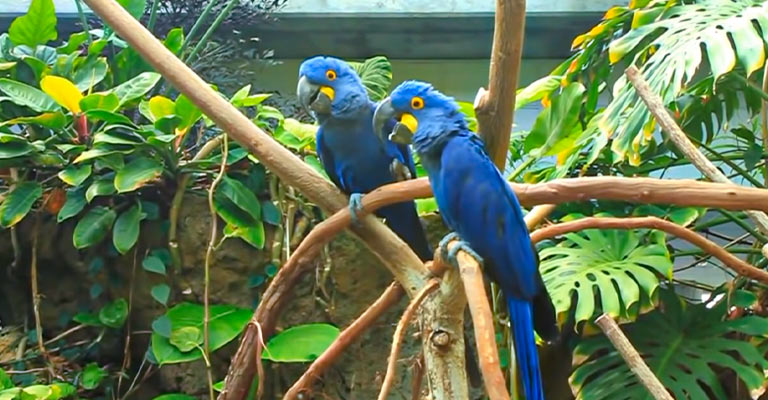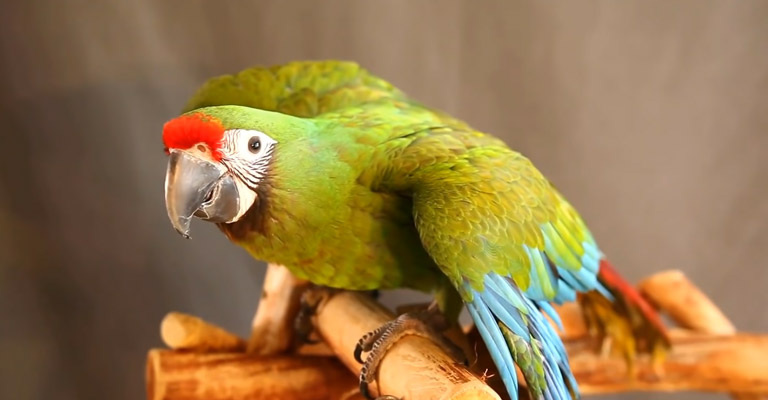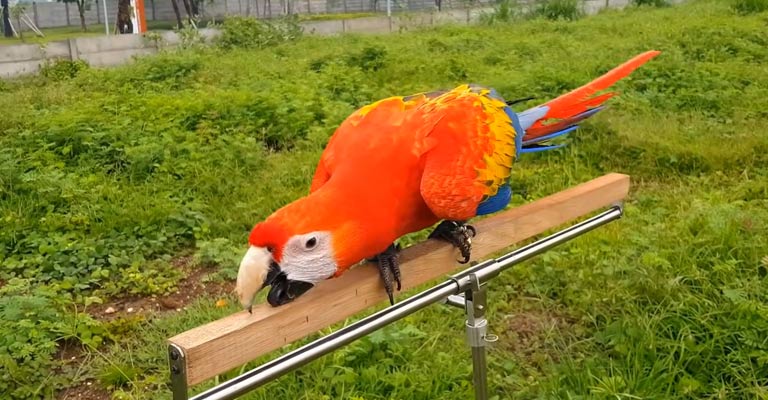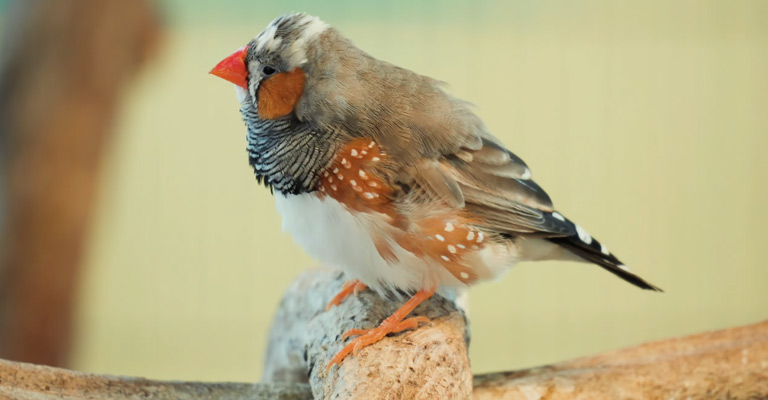Welcoming a macaw into your home is an exciting endeavor, but it’s essential to consider the social nature of these magnificent birds. Macaws thrive on interaction, and while they can form strong bonds with humans, some macaw owners choose to provide additional avian companionship.
However, not all birds are compatible with macaws, making the selection process critical for a harmonious living arrangement.
In this blog post, we’ll delve into the fascinating world of avian companionship for macaws. We’ll explore which bird species can live together with macaws and the considerations that go into making this decision.
Whether you’re a seasoned macaw owner or contemplating introducing a new feathered friend to your macaw, this guide will provide valuable insights and guidelines for a successful and happy avian household.

Can Macaws Live Together With Any Birds?
Macaws are social birds that can potentially live with other bird species, but successful cohabitation depends on various factors. It’s crucial to consider the compatibility of size, temperament, and dietary needs. Macaws are large, strong birds and may intimidate smaller or more timid species, leading to aggression or stress.
Generally, some larger parrot species, such as Amazons or African Greys, might be suitable companions for macaws if introduced gradually and monitored closely. However, even within these species, individual personalities play a significant role in determining compatibility.
Mixed-species aviaries are possible with careful planning and supervision, but it’s vital to ensure all birds have enough space, enrichment, and resources.
Additionally, consult with an avian expert or veterinarian to assess the specific situation, as not all macaws will tolerate or thrive in multi-species environments. Ultimately, the key is to prioritize the well-being and safety of all birds involved.
The Challenges of Keeping Multiple BirdsTogether
Keeping multiple birds together can be rewarding but also comes with several challenges that bird owners should consider:
- Compatibility Issues: Birds have varying personalities and social needs. Mixing species or individuals with conflicting temperaments can lead to stress, aggression, or even harm.
- Territorial Behavior: Birds can be territorial, especially during breeding seasons. This can result in aggression towards cage mates or other birds sharing the same space.
- Disease Transmission: Close contact between birds can facilitate the spread of diseases. Quarantining new birds and regular health check-ups are essential to prevent outbreaks.
- Dietary Differences: Different bird species often have distinct dietary requirements. Ensuring each bird receives the right nutrition can be a challenge.
- Space Requirements: Birds need ample space to fly, exercise, and establish their territories. Overcrowding can lead to stress and territorial conflicts.
- Noise Levels: Multiple birds can create a cacophony, which may disturb neighbors or household members.
- Cleaning and Hygiene: More birds mean more waste to clean up, and maintaining a clean environment is crucial for their health.
- Time and Attention: Each bird requires individual attention and care. Handling multiple birds can be time-consuming.
- Social Isolation: While some species are social, others are more solitary. Keeping solitary birds with highly social species can lead to loneliness or stress.
- Breeding Concerns: If not carefully monitored, mixed-gender groups can lead to unplanned breeding, which can be challenging to manage.
To successfully keep multiple birds together, thorough research on the specific species involved, proper housing, and attentive care are essential. It’s advisable to consult with avian experts or veterinarians for guidance on creating a harmonious multi-bird environment while addressing the unique challenges that may arise.
Things to Consider While Choose a Companion for A Macaw

Selecting an appropriate companion for a macaw is a significant decision that should be made carefully, considering various factors to ensure the well-being and happiness of both birds.
Here are several crucial considerations when choosing a companion for a macaw:
Species Compatibility
Not all birds are suitable companions for macaws. It’s essential to choose a bird species that has a compatible temperament and size.
Generally, other large parrots, such as Amazons, African Greys, or conures, might be more compatible due to similar size and social needs. Research the specific species to understand their behaviors and needs.
Individual Personality
Each bird has a unique personality, so it’s crucial to introduce potential companions gradually and observe their interactions. Ideally, choose a companion bird that exhibits a calm and non-aggressive demeanor, as macaws can be dominant and territorial.
Age and Gender
The age and gender of the companion bird can influence the dynamics in the cage. It’s often recommended to pair birds of similar ages and the same gender to avoid potential breeding-related issues and conflicts.
Quarantine and Health
Quarantine any new bird before introducing it to your macaw to ensure it’s free of diseases. A veterinarian’s examination is essential to confirm the newcomer’s health status and address any potential health issues.
Housing and Space
Macaws require a spacious and well-structured cage or aviary. Ensure there is enough room for both birds to move, perch, and fly. Separate perching areas and feeding stations can help prevent territorial disputes.
Dietary Compatibility
Birds have varying dietary needs. Make sure the companion bird’s diet aligns with the macaw’s nutritional requirements. Consult with an avian veterinarian for dietary recommendations.
Social Interaction
Macaws are highly social birds and require social interaction and mental stimulation. The companion bird should be equally social and engaging to prevent loneliness and boredom.
Supervision
Initially, closely supervise the interaction between the macaw and the new companion. This allows you to intervene if any conflicts arise and ensures both birds adjust comfortably to each other’s presence.
Training and Behavior
Consider the training and behavior of both birds. If either bird has behavioral issues or aggressive tendencies, it may not be suitable for companionship.
Long-Term Commitment
Keep in mind that macaws and their companions can have long lifespans. Ensure you are prepared for the lifelong commitment of caring for both birds and consider what will happen if one bird outlives the other.
Professional Guidance
Consult with an avian veterinarian or a knowledgeable bird behaviorist for advice on introducing and maintaining harmony between the macaw and its companion.
Remember that introducing a companion to a macaw is a gradual process, and patience is key. It’s essential to prioritize the well-being and happiness of both birds throughout their time together, providing them with a safe and stimulating environment where they can thrive and build a strong bond.
What Birds Can Live with Macaws?

While macaws are social birds, their compatibility with other bird species depends on various factors such as size, temperament, and individual personalities.
Here are some bird species that are generally considered more compatible with macaws:
Other Macaws
Macaws are often happiest when paired with their own species. They can form strong bonds and enjoy each other’s company. However, it’s essential to ensure that the macaws are of similar size and temperament to prevent aggression.
Amazons
Amazon parrots are similar in size to macaws and can make suitable companions. They have vibrant personalities and can often coexist peacefully with macaws.
African Greys
African Grey parrots are known for their intelligence and social nature. They can be compatible with macaws, although individual personalities play a significant role in their compatibility.
Conures
Some conure species, such as the Sun Conure and the Blue-crowned Conure, are known for their social nature and can live harmoniously with macaws. However, care must be taken to ensure that the macaw doesn’t intimidate the smaller conures.
Eclectus Parrots
Eclectus parrots are medium-sized birds with calm temperaments. They can be a good match for macaws if introduced properly.
Pionus Parrots
Pionus parrots are similar in size to conures and are generally peaceful birds. They may coexist well with macaws, but individual personalities should be considered.
Caiques
Caiques are small to medium-sized parrots known for their playful and energetic nature. They can make entertaining companions for macaws, but their size difference should be managed carefully.
Budgerigars (Budgies)
Budgerigars are smaller birds, and while they might not be companions in the traditional sense, they can often share an aviary or living space with macaws as long as there is enough room and they have their space to retreat to.
It’s crucial to remember that individual personalities and temperaments vary among birds, even within the same species. Before introducing a companion bird to a macaw, consider conducting a gradual and supervised introduction process to ensure they get along.
Additionally, always monitor their interactions to prevent aggression or stress. Consulting with an avian veterinarian or a bird behaviorist can provide valuable guidance in selecting a suitable companion for your macaw.
Birds to Avoid Keeping with Macaws
While some bird species can potentially coexist with macaws, there are certain birds that should generally be avoided as companions due to differences in size, temperament, and potential for conflicts.
Here are some types of birds to avoid keeping with macaws:
Small Birds

Birds significantly smaller than macaws, such as canaries, finches, and lovebirds, should be avoided. Macaws may view them as prey or play too roughly, leading to injury or even death.
Timid or Passive Species
Birds with shy or passive personalities, such as doves or button quail, may be stressed or bullied by the more assertive and larger macaws.
Aggressive or Dominant Species
Birds known for their territorial or aggressive behavior, like some cockatoo species, should not be housed with macaws. Both birds may compete for dominance, leading to fights and stress.
Parakeets (Budgerigars)
Budgerigars are small and fragile compared to macaws and may not thrive in the same environment. Their small size makes them vulnerable to aggression and stress.
Cockatiels
Cockatiels are smaller parrots and may not cope well with the size and assertiveness of macaws. They could become targets for aggressive behavior.
Canaries and Finches
These tiny birds are best kept separately from macaws due to their delicate nature and size. Macaws may unintentionally harm them during play or interactions.
Migratory or Wild Birds
It’s crucial not to mix macaws with wild or migratory birds as it can lead to stress, disease transmission, or legal complications.
Songbirds and Exotic Finches
Certain songbirds and exotic finches have specific habitat and social requirements that may not align with macaw needs. Mixing them can result in an unhappy environment for all birds involved.
Aggressive Macaw Varieties
Some macaw species, such as the Blue-and-Gold Macaw or the Green-winged Macaw, are known for their assertive personalities. Keeping two aggressive macaw varieties together can lead to constant conflicts and stress.
Species with Dietary Conflicts
Birds with vastly different dietary needs can face nutritional problems when housed together. It’s essential to ensure that all birds in a shared environment receive appropriate nutrition.
In general, when considering companion birds for macaws, choose species of similar size, temperament, and social needs. Always introduce new birds gradually and under supervision to monitor their interactions.
Consulting with a bird behaviorist or avian veterinarian can provide expert guidance on selecting compatible companion birds for your macaw. Ultimately, the safety and well-being of all birds involved should be the top priority.
Tips on Proper Introduction of Macaws to a New Bird
Introducing a new bird, whether it’s a macaw or another species, to an existing bird can be a delicate process. Here are some tips to help ensure a smooth and safe introduction:
Quarantine Period
Before introducing the new bird to your macaw, keep it in quarantine for a minimum of 30 days. This helps to ensure the newcomer is healthy and doesn’t introduce diseases to your macaw.
Separate Cages
House the new bird in a separate cage within the same room as your macaw. This allows them to become familiar with each other’s presence without direct contact.
Gradual Introduction
After the quarantine period, begin gradual introductions. Place the cages next to each other, allowing the birds to observe and get used to each other’s presence.
Observe Reactions
Watch both birds closely for signs of aggression, fear, or stress during these initial meetings. If either bird shows extreme signs of stress or aggression, separate them and try again later.
Neutral Territory
When you feel both birds are becoming comfortable with each other’s presence, choose a neutral space (not in the cages) for their first face-to-face interaction. This can be a play gym or a neutral room.
Supervised Interaction
During the initial face-to-face meetings, keep a close eye on both birds. Be prepared to intervene if aggression or territorial behavior arises. Use a thick glove or a towel to protect yourself if needed.
Positive Reinforcement
Reward both birds with treats and praise when they exhibit calm or friendly behavior toward each other. This reinforces positive interactions.
Time and Patience
The introduction process can take days, weeks, or even months. Be patient and allow the birds to establish their own comfort level and relationship.
Separate Living Spaces
Even after successful introductions, it’s a good idea to provide separate living spaces for both birds. This allows them to have their space when needed and reduces the potential for territorial disputes.
Consult with an Expert
If you’re unsure about the introduction process or encounter persistent aggression, consult with an avian behaviorist or veterinarian with expertise in bird behavior. They can provide specific guidance tailored to your birds’ needs.
Remember that not all birds will become best friends, and some may never fully accept each other’s presence. In some cases, they may coexist peacefully with minimal interaction, which is also a successful outcome. The key is to prioritize the safety and well-being of both birds throughout the process.
FAQs
Yes, macaws can often live harmoniously with other parrot species of similar size and temperament. Suitable companions may include Amazon parrots, African Greys, and conures, but compatibility depends on individual personalities and proper introduction.
It’s generally not recommended to house macaws with significantly smaller birds like budgerigars. Macaws may unintentionally harm or stress these smaller birds due to their size and differing temperaments.
Some macaw species, like Blue-and-Gold Macaws or Green-winged Macaws, can be more social and may have a better chance of coexisting with other birds. However, compatibility still depends on individual personalities and proper introductions.
When introducing a new bird to a macaw, quarantine the newcomer, introduce gradually, and monitor interactions closely. Choose a neutral space for initial meetings and be prepared to intervene in case of aggression. Reward positive interactions and consult with experts if needed.
Macaws are best suited to live with other parrot species. Introducing them to non-parrot birds, such as canaries or finches, is not advisable due to size differences and potential stress or harm to the smaller birds.
Wrapping Up
In the world of avian companionship, choosing the right feathered friend for your macaw is crucial for their well-being and happiness. While macaws are social birds, compatibility depends on various factors, including size, temperament, and individual personalities.
By considering these factors and following proper introduction protocols, you can create a harmonious environment where your macaw can enjoy the company of compatible avian companions.
Remember that patience and careful observation are key to ensuring that your macaw and its feathered friend can coexist peacefully and thrive in their shared aviary or living space.
Have a nice day.